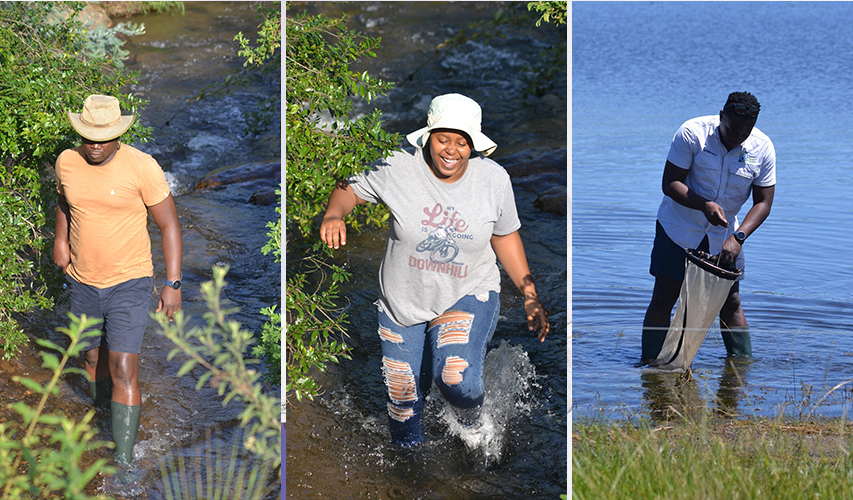Dr Dalu and Mr Munyai are lecturers at the University of Mpumalanga School of Biology and Environmental Sciences have been invited to collaborate on the LandComp project, which is short for “the interactions between LAND use, substrate quality and consumers on global patterns of leaf litter deCOMPosition in stream ecosystems.
The research came from previous global collaborations that Dr Dalu was engaged in, which led to an invitation from Project Team Leaders, who were looking to have a global footprint. Dr Dalu and Mr Munyai are working on the project with UMP BSc Honours Ecology student, Sobahle Hlophe.
The findings of the study will be applied to Mpumalanga province and the greater South Africa. A research publication for the region will be published led by Bachelor Science Honours student Sobahle Hlophe and the results will further feed into the global publication led by Professor Swan.
“The research is being conducted in South Africa with sites mostly dotted around the Nelspruit region and include urban, agriculture, forest, and pine plantation sites.
The project is important as ecosystem processes in stream ecosystems are the processing of terrestrially-derived leaf litter from stream-side vegetation, with the breakdown largely a function of the leaf chemistry, consumers, and environmental conditions,” explains Dr Dalu.
 The three UMP researchers: Dr Dalu, Mr Munyai and BSc student Ms Hlophe.
The three UMP researchers: Dr Dalu, Mr Munyai and BSc student Ms Hlophe.
In stream ecosystems, changes in watershed land use from forest to agriculture, urban, and plantation results in habitat changes in the stream environment. For example, sediment mobility changes in the landscape due to agricultural activities lead to substrate distribution shifts, which is important to the species composition of invertebrate communities known to be important to regulating the processing of leaf litter.
Impervious cover that characterises urban landscapes disrupts the dynamic equilibrium of sediment flux, exporting more than that imported, driving river channels down and, as in agricultural streams, shifting substrate distribution.”
Dr Dalu further adds that flow dynamics are altered, resulting in much more intense, shorter-duration disturbance events than those experienced by forested streams. Furthermore, thermal regimes are altered in summer months as warm water is heated dramatically from impervious surfaces before being exported to the stream environment.
“This has implications not only for the tolerances of invertebrate taxa but also for microbial decomposers as well. Taken together, it is expected that upstream land use should drive shifts in the processing of leaf litter decomposition, owing mainly to altered flow regimes, elevated temperatures, shifts in habitat, and interactions with substrate (litter) chemistry.”
Story by Lisa Thabethe. Pictures supplied by Aquatic Systems Research Group.